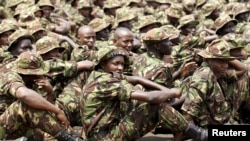The Pentagon says a U.S. airstrike against al-Shabab in Somalia last Saturday killed more than 150 militants. Analysts say the strike was a major coup but that African Union troops in Somalia still have a long fight ahead of them.
In an interview with VOA, Somali presidential spokesman Daud Aweys applauded the airstrike. He said Somalia was aware of the operation and contributed intelligence.
“We think that this was a significant victory not only for Somalia but also for the entire region as we face the same challenges on the war against terror. This was a coordinated attack in which Somali forces shared (intelligence) with their U.S. counterpart. These areas have been under a close surveillance,” Aweys said.
The training camp targeted is located 190 kilometers north of Mogadishu.
Pentagon spokesman Captain Jeff Davis said the U.S. had learned the fighters were set to depart the camp, and "posed an imminent threat" to African Union forces and U.S. military advisers in Somalia.
An al-Shabab spokesman, Abu Musab, confirmed the aerial attack but said the death toll was exaggerated. He said al-Shabab doesn’t gather more than 100 fighters in one place for security reasons.
Lucky Strike
Analyst Yan St. Pierre, who runs the Berlin-based security firm MOSECON, said the opportunity for such a large strike may not come again.
“Usually, al-Shabab, historically speaking, they have always spread [their] troops very well, so if this was indeed the case [that] they had so many people in one location, it’s a strategic mistake that definitely they are bound not to repeat,” St. Pierre said.
Al-Shabab has kept up a steady string of bombings against civilians in Mogadishu while also going after African Union troops with renewed vigor since the middle of last year.
On January 15, al-Shabab fighters stormed a Kenyan army camp in El-Adde. In February, the Somali president said 200 soldiers lost their lives in that attack, a claim denied by the Kenyan government.
Security observers say heavy losses in these and other recent raids are damaging the effectiveness and reputation of the African Union force, AMISOM.
Analyst St. Pierre said airstrikes won't necessarily ease that pressure on ground troops.
“Any American or Western support will be from the air, so they (al-Shabab) adjust their strategies accordingly while maintaining focus on the local troops. The real message really needs to come from AMISOM. It needs to come from the Kenya Defense Forces and Somali troops much more than the Americans,” St. Pierre said.
AMISOM has been fighting al-Shabab in Somalia since 2007. The force currently has 22,000 men on the ground to provide assistance to the internationally recognized Somali government.





